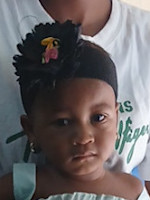

Birthday
May 11, 2024
Age
Age: 1
Gender
Girl


Anyelina is 1 years old and lives in Dominican Republic.
I live with my mother in the Azua area. The primary language where I live is Spanish. My mother is sometimes employed as a homemaker. I like dolls, listening to stories and music. My favourite activity at church is Sunday school. I am not currently attending school.
The Dominican Republic occupies the eastern two-thirds of the island of Hispaniola, which it shares with Haiti. It has a tropical climate, but moist, year-round trade winds keep temperatures between 72° and 83°Fahrenheit.
Almost 90 percent Dominicans live in rural areas where unemployment is high and malnutrition widespread. A family's diet consists mainly of rice, beans, and fish. Spanish is the official language, and Catholicism is the state religion.
In 1492, Columbus discovered Hispaniola, and the island became the center of Spanish rule in the West Indies. Soon, the indigenous people were wiped out, and slaves were brought from Africa to populate the island. The descendants of those slaves form most of the population today. For three centuries Hispaniola was governed by Spain, then by France. In 1804, the island won independence as the republic of Haiti. Forty years later, the eastern two-thirds of the island revolted and formed the Dominican Republic. Except for a brief period of annexation to Spain, the Dominican Republic has been independent ever since.

Compassion’s ministry is focused on what we call holistic child development. This means developing children in all the different aspects of their lives—their minds, bodies and relationships—while giving them the opportunity to hear about and experience the love of Jesus from caring local church staff and volunteers.
Absolutely not! We encourage children and families of all faiths and backgrounds to register in our programs and would never require or coerce anyone to convert to Christianity.
Learn MoreToday, children around the world are discovering that poverty doesn’t have to be their future. Help one more do the same by sponsoring with Compassion!

While we're sorry you could not sponsor this specific child, we would love to help you find a different child to sponsor.
Age: